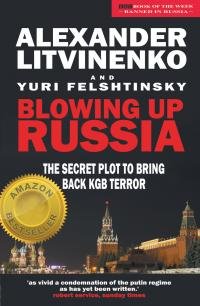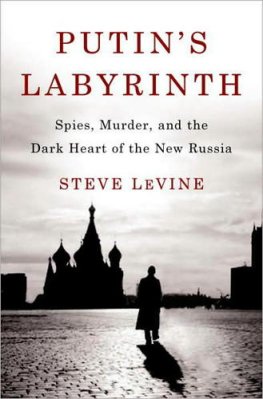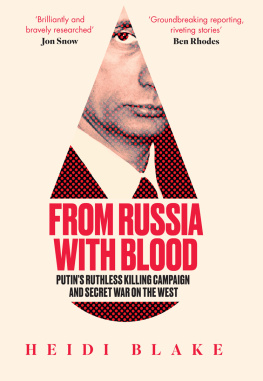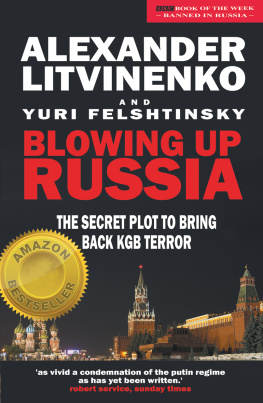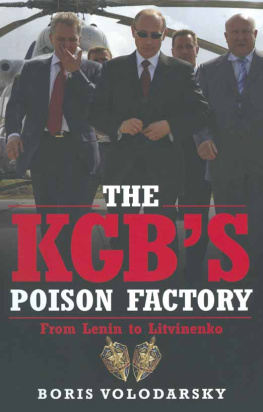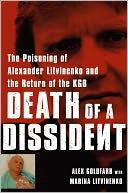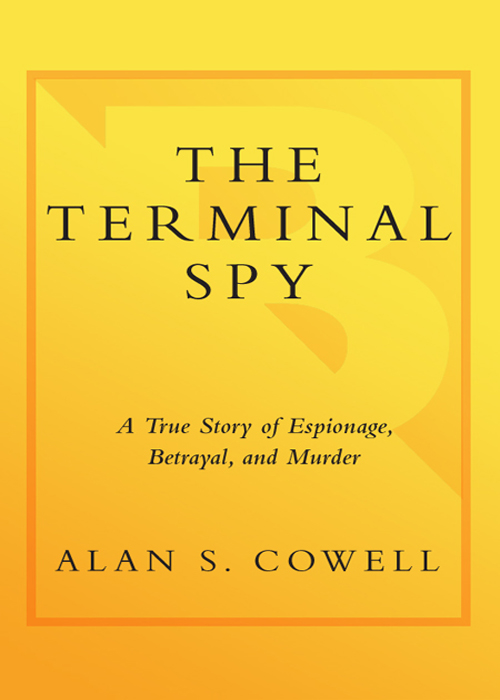
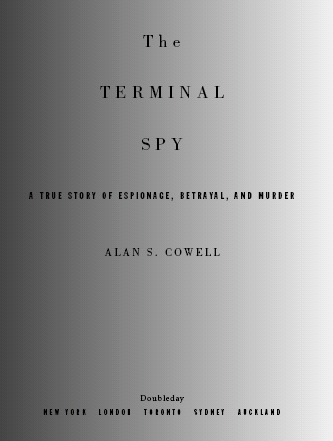
CONTENTS
For Sue
AUTHORS NOTE
The reporting for this book began when, as head of the New York Times bureau in London, I covered the breaking news of the Litvinenko case in the days before and after his death. Over the subsequent weeks and months, my research expanded to include interviews and conversations with contacts and the key players in Austria, Britain, France, Germany, Israel, Italy, Russia, and the United States. Throughout the book I have tried to identify by name the people I spoke to. But there were other sources who could not be so easily identified because of the nature of their work. In the case of informants able to speak only in return for anonymity, I have honored their desire for confidentiality.
Alan S. Cowell
Paris, May 2008
DRAMATIS PERSONAE
The Victims
LITVINENKO, ALEXANDER: former officer in the KGB and FSB
POLITKOVSKAYA, ANNA: Russian journalist, murdered in Moscow, October 2006
Visitors to London, November 2006
KOVTUN, DMITRI: former Soviet army officer, business associate of Andrei Lugovoi
LUGOVOI, ANDREI: former KGB bodyguard, now owner of a private security company and member of the Duma
SOKOLENKO, VYACHESLAV: former KGB bodyguard, business associate of Andrei Lugovoi
Londongrad
ABRAMOVICH, ROMAN: wealthy Russian tycoon, owner of Londons Chelsea soccer club, former business associate of Boris Berezovsky
BEREZOVSKY, BORIS: wealthy Russian tycoon in self-exile in Britain, bitter opponent of Vladimir Putin, onetime employer of Andrei Lugovoi and Alexander Litvinenko
BUKOVSKY, VLADIMIR: Soviet-era dissident living in Cambridge, England
CLARKE, PETER: head of British counterterrorism police
GORDIEVSKY, OLEG: former KGB double agent and defector to Britain
HYATT, BRENT: British detective investigating the murder of Alexander Litvinenko
ZAKAYEV, AKHMED: exiled Chechen leader in London and neighbor of Alexander Litvinenko
The Kremlin
MEDVEDEV, DMITRI: president of Russia nominated by Vladimir Putin
PUTIN, VLADIMIR: former KGB officer, ex-president, now prime minister, of Russia
YELTSIN, BORIS: former president of Russia
The Family
BELYAVSKAYA, NINA: mother of Alexander Litvinenko
LITVINENKO, MARINA: second wife of Alexander Litvinenko
LITVINENKO, MAXIM: half brother of Alexander Litvinenko, living in Italy
LITVINENKO, NATALIA: first wife of Alexander Litvinenko
LITVINENKO, WALTER: father of Alexander and Maxim Litvinenko
The American Connection
FELSHTINSKY, YURI: Russian-American historian, sometime associate of Boris Berezovsky, living in Boston
GOLDFARB, ALEX: senior aide to Boris Berezovsky, living in New York
SHVETS, YURI: former KGB officer living in Washington, D.C.
The French Connection
LIMAREV, YEVGENY: Russian security consultant living in France
The Italian Connection
GUZZANTI, PAOLO: head of the Mitrokhin Commission investigating KGB activity in Europe
SCARAMELLA, MARIO: Italian researcher, consultant to the Mitrokhin Commission
The FSB Connection
GUSAK, ALEXANDER: former commander of Alexander Litvinenko in URPO unit of FSB
KHOKHOLKOV, YEVGENY: former commanding officer of URPO unit of FSB
PATRUSHEV, NIKOLAI: head of the FSB
PONKIN, ANDREI: former FSB colleague of Alexander Litvinenko in URPO unit
SHEBALIN, VIKTOR: former FSB colleague of Alexander Litvinenko in URPO unit
TREPASHKIN, MIKHAIL: FSB whistle-blower
TROFIMOV, ANATOLY: Moscow regional chief of FSB, murdered in Moscow, April 2005
Business Connections
GLUSHKOV, NIKOLAI: Berezovsky associate jailed in connection with Aeroflot embezzlement case
KHODORKOVSKY, MIKHAIL: former head of Yukos oil company, imprisoned on embezzlement and fraud charges
The KGB Connection
CHEMEZOV, SERGEI: contemporary of Putin in the Dresden station of the KGB, headed the state arms exporter
CHERKESOV, VIKTOR: former KGB officer in Leningrad, head of Russias drug-control agency
IVANOV, SERGEI: former KGB spy, first deputy prime minister of Russia
IVANOV, VIKTOR: former KGB officer and senior aide to Vladimir Putin, chairman of Aeroflot
KHOKHLOV, NIKOLAI: KGB defector, poisoned in Frankfurt, 1957
SUDOPLATOV, PAVEL: former officer of Stalins secret police
The History
CURIE, MARIE AND PIERRE: discoverers of polonium
PROLOGUE
The English autumn was unseasonably warm, and November 1, 2006the day Alexander Litvinenko began to diewas no exception.
A breeze from the northwest rustled leaves turned gold on the trees of Muswell Hilla demure suburb of Edwardian row houses in north London. The temperature was in single digits on the Celsius scale but well above freezing. The red double-deck buses ran in their familiar not-quite-predictable way. Life unfolded with the unhurried complacency of far-flung neighborhoods when those abandoned to humdrum routines pause between the days panicky bookendsthe school run, the supermarket, the dry cleaner, the post office, furtive affairs, perhaps, behind hastily drawn curtains.
The climate, not to mention the tranquillity, must have seemed incongruous to Litvinenko, a onetime secret agent turned whistle-blower, an exile and defector from his native Russia and bitter enemy of its regime. Raised for many years in the northern Caucasus, he had trained for a career in the KGB to spy on his comrades, to interrogate ragged child prisoners from Chechnya, and to chase down the Russian mafia in Moscow. But Litvinenko had turned his back on all that, on everything he had been taught to do, as the Soviet Union dissolved into the new Russia. Brazenly, he defied his masters in Moscow, betraying what he insisted were their innermost secrets.
Now it was payback time, although, as so often in matters of deceit, the victim was the last to know.
On this day in late 2006the last when his life might pass for normal within the somewhat abnormal migr circles he inhabitedLitvinenko bade farewell to his elegantly coiffed wife, Marina, and his gifted twelve-year-old son, Anatoly, of whom he was exceptionally proud. He headed for the city centerthe capital of his own adoptive land. Just weeks earlier, on October 13, Litvinenko and his family had been granted citizenship, and he boasted happily to friends that he was British. He brandished his pristine plum-colored passport, proclaiming with an almost childish delight that it was his protector, the freshly burnished shield of this crusader against evil, this champion of the free (this tilter at windmills, some thought, this swashbuckling DArtagnan).
To mark the familys new status, his son hung their new bannerthe red-on-white cross of St. George, the English emblemfrom the first-floor balcony of the Litvinenkos pale brick town house a mile north of the center of Muswell Hill at 140 Osier Crescent.
The three-story house was one more unassuming home in a new-looking development in the commuter belt on a quiet street that filled with young children when the school day ended and with parked cars when the workday was over. But for Litvinenko it was his castle. Outlawed and outcast by the Kremlin, given refuge in London, he told his wife with tragic navet that they were safe now.
In many ways the journey from his semi-gentrified suburb to MayfairLondons swankiest square mileoffered a metaphor for his own life, caught between dream and reality, between modest circumstance and grand vision.
Next page

